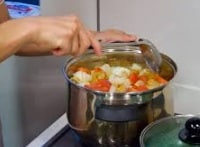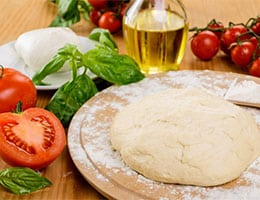 The concept of ingredient comes from the Latin word ingrediens , in turn derived from ingrĕdi (which can be translated as “enter into” ). The term refers to that which is part of a gastronomic recipe , a remedy or another preparation.
The concept of ingredient comes from the Latin word ingrediens , in turn derived from ingrĕdi (which can be translated as “enter into” ). The term refers to that which is part of a gastronomic recipe , a remedy or another preparation.
For example: “The cake has only four ingredients: chocolate, milk, egg and flour” , “These pills have several ingredients that help minimize inflammation of the mucous membranes” , “Maybe some ingredient in the soda caused me an allergic reaction” .
At a general level it can be said that ingredients are substances that are used to make a mixture . It is common, although it depends on each case, that the ingredient must be used in exact quantities or doses so that the result of the combination is the desired one.
The basic ingredients to prepare pizza dough, to name one example, are flour , water , yeast and oil , without leaving out salt. Although the proportions vary according to the desired thickness, it can be said that to make three pizzas, these ingredients are required in the following quantities: one kilogram of flour, 600 cubic centimeters of water, 50 milliliters of oil and 45 grams of fresh yeast.
The idea of ingredient can also refer to the components of a salad or a snack : “I'm going to order a salad with three ingredients: tomato, hard-boiled egg and onion” , “I already bought cheese, ham, salami, peanuts and French fries... What other ingredient is missing for tonight's snack?” .
The kitchen is a space open to creativity , while governed by a strong structure of traditions and rules. It is a peculiar combination of rigidity and flexibility that - like any other field of knowledge, especially the artistic ones - evolves thanks to the genius of those few who dare to go against the impositions. The list of ingredients in a recipe may seem like unchangeable points for many, but people with true culinary talent do not allow themselves to be limited by it.
 If we are about to prepare a dish and we notice that we are missing an ingredient, unless it is absolutely necessary (such as flour to make a pizza) there is always an alternative, whether someone else has discovered it or not. Cooking is like painting, like music or writing: if we do not have the pressure to reproduce a recipe indefinitely, as happens in restaurants, then we should let ourselves be carried away by the creativity and spontaneity of the moment. Sometimes a missing ingredient can lead to a great new recipe .
If we are about to prepare a dish and we notice that we are missing an ingredient, unless it is absolutely necessary (such as flour to make a pizza) there is always an alternative, whether someone else has discovered it or not. Cooking is like painting, like music or writing: if we do not have the pressure to reproduce a recipe indefinitely, as happens in restaurants, then we should let ourselves be carried away by the creativity and spontaneity of the moment. Sometimes a missing ingredient can lead to a great new recipe .
The notion, finally, is used symbolically to name the elements that appear in an artistic work: “This film has all the necessary ingredients to be a success,” “The humorous ingredients help minimize the dramatic component of the novel.” ” .
In this framework, the ingredients of a work are all its components , at least those that can be perceived by the public. This includes the actors, the script, the direction, the lighting, the music and the costumes , among other aspects such as the geographical regions chosen for filming (in the case of a film) and the special participation of certain personalities (which which is currently known as "cameo").
When we highlight a work for its ingredients we refer not only to the quality of the parts but to the way in which they have been combined. On the other hand, it is also possible to say "this film had all the ingredients to be perfect but certain decisions have ruined it"; Sometimes it happens that due to details in the script or direction, for example, an apparently perfect formula fails to shine.
